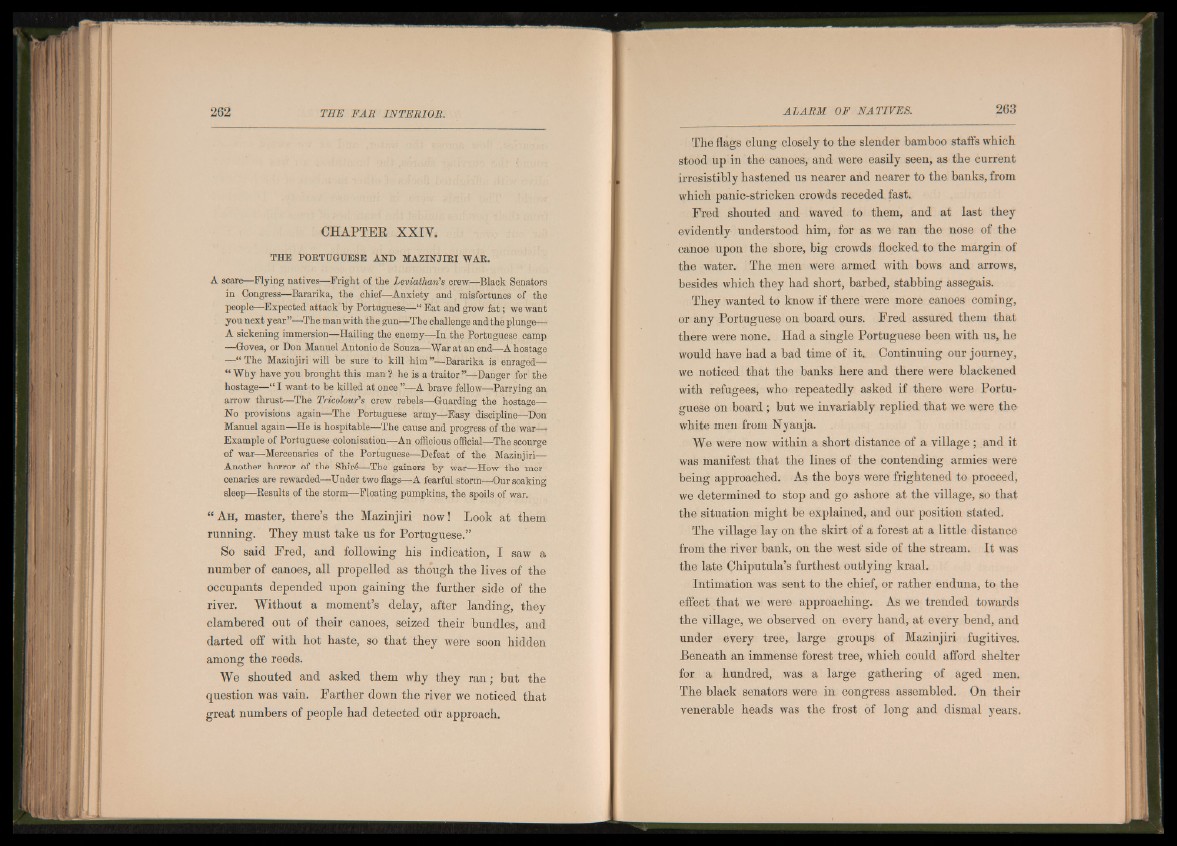
CHAPTER XXIV,
THE PORTUGUESE AND MAZINJIKI WAR.
A scare—Flying natives—Fright of the Leviathan’s crew—Black Senators
in Congress—Bararika, the chief—Anxiety and misfortunes of the
people—Expected attack hy Portuguese—“ Eat and grow fa t; we want
you next year’’—The man with the gun—The challenge and the plunge—1
A sickening immersion—Hailing the enemy—In the Portuguese camp
—Govea, or Don Manuel Antonio de Souza—War at an end—A hostage
—“ The Mazinjiri will be sure to kill him”—Bararika is enraged—
“Why have you brought this man ? he is a traitor’’—Danger for the
hostage—“ I want to be killed at once ”•—A brave fellow—Parrying an
arrow thrust—The Tricolour’s crew rebels—Guarding the hostage—
No provisions again—The Portuguese army—Easy discipline—Don
Manuel again—He is hospitable—The cause and progress of the war—
Example of Portuguese colonisation—An officious official—The scourge
of war—Mercenaries of the Portuguese—Defeat of the Mazinjiri—
Another horror of the Shir6—The gainers by war—How the mercenaries
are rewarded—Under two flags—A fearful storm—Our soaking
sleep—Results of the storm—Floating pumpkins, the spoils of war,
“ A h , master, there’s the Mazinjiri now! Look at them
running. They must take us for Portuguese.”
So said Fred, and following his indication, I saw a
number of canoes, all propelled as though the lives of the
occupants depended upon gaining the further side of the
river. Without a moment’s delay, after landing, they
clambered out of their canoes, seized their bundles, and
darted off with hot haste, so that they were soon hidden
among the reeds.
We shouted and asked them why they ra n ; but the
question was vain. Farther down the river we noticed that
great numbers of people had detected oUr approach.
The flags clung closely to the slender bamboo staffs which
stood up in the canoes, and were easily seen, as the current
irresistibly hastened us nearer and nearer to the banks, from
which panic-stricken crowds receded fast.
Fred shouted and waved to them, and at last they
evidently understood him, for as we ran the nose of the
canoe upon the shore, big crowds flocked to the margin of
the water. The men were armed with bows and arrows,
besides which they had short, barbed, stabbing assegais.
They wanted to know if there were more canoes coming,
or any Portuguese on board ours. Fred assured them that
there were none. Had a single Portuguese been with us, he
would have had a bad time of it. Continuing our journey,
we noticed that the banks here and there were blackened
with refugees, who repeatedly asked if there were Portuguese
on board ; but we invariably replied that we were the
white men from Nyanja.
We were now within a short distance of a village; and it
was manifest that the lines of the contending armies were
being approached. As the boys were frightened to proceed,
we determined to stop and go ashore at the village, so that
the situation might be explained, and our position stated.
The village lay on the skirt of a forest at a little distance
from the river bank, on the west side of the stream. It was
the late Chiputula’s furthest outlying kraal.
Intimation was sent to the chief, or rather enduna, to the
effect that we were approaching. As we trended towards
the village, we observed on every hand, at every bend, and
under every tree, large groups of Mazinjiri fugitives.
Beneath an immense forest tree, which could afford shelter
for a hundred, was a large gathering of aged men.
The black senators were in congress assembled. On their
venerable heads was the frost of long and dismal years.